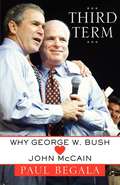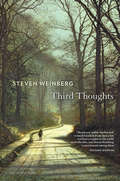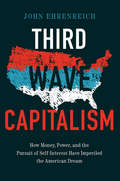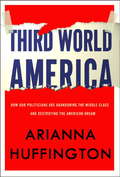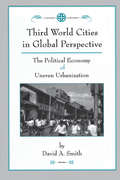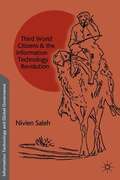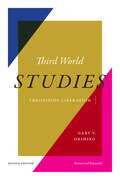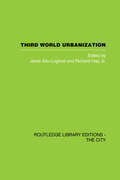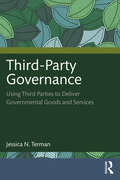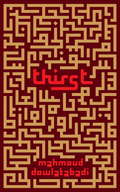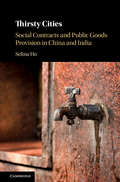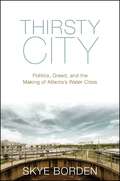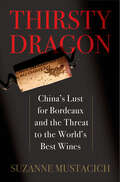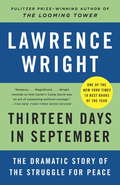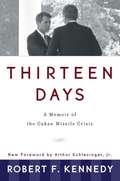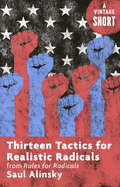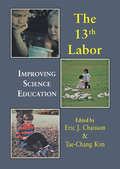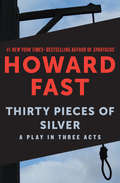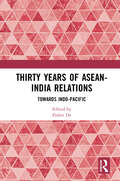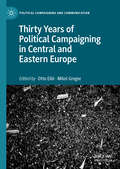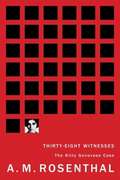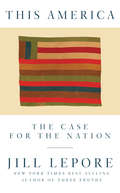- Table View
- List View
Third Term
by Paul BegalaFor Democrats, Independents, and the majority of Republicans who are fed up with the GOP, a handbook for the most important election in our lifetime. With the indispensable chapters: The John McCain Quiz and Things John McCain is Older Than. In details that will surprise even close followers of the political scene, veteran political strategist Paul Begala thoroughly makes the case that John McCain would be a third term for George W. Bush. He explodes the myth that John McCain is a maverick, and proves powerfully that he's just four more years of the same old thing.
Third Thoughts
by Steven WeinbergOne of the world’s most captivating scientists challenges us to think about nature’s foundations and the entanglement of science and society. Steven Weinberg, author of The First Three Minutes, offers his views on fascinating aspects of physics and the universe, but does not seclude science behind disciplinary walls, or shy away from politics.
Third Wave Capitalism: How Money, Power, and the Pursuit of Self-Interest Have Imperiled the American Dream
by John EhrenreichIn Third Wave Capitalism, John Ehrenreich documents the emergence of a new stage in the history of American capitalism. Just as the industrial capitalism of the nineteenth century gave way to corporate capitalism in the twentieth, recent decades have witnessed corporate capitalism evolving into a new phase, which Ehrenreich calls "Third Wave Capitalism." Third Wave Capitalism is marked by apparent contradictions: Rapid growth in productivity and lagging wages; fabulous wealth for the 1 percent and the persistence of high levels of poverty; increases in the standard of living and increases in mental illness, personal misery, and political rage; the apotheosis of the individual and the deterioration of democracy; increases in life expectancy and out-of-control medical costs; an African American president and the incarceration of a large percentage of the black population. Ehrenreich asserts that these phenomena are evidence that a virulent, individualist, winner-take-all ideology and a virtual fusion of government and business have subverted the American dream. Greed and economic inequality reinforce the sense that each of us is “on our own.” The result is widespread lack of faith in collective responses to our common problems. The collapse of any organized opposition to business demands makes political solutions ever more difficult to imagine. Ehrenreich traces the impact of these changes on American health care, school reform, income distribution, racial inequities, and personal emotional distress. Not simply a lament, Ehrenreich's book seeks clues for breaking out of our current stalemate and proposes a strategy to create a new narrative in which change becomes possible.
Third World America: How Our Politicians Are Abandoning the Average Citizen
by Arianna HuffingtonIt's not an exaggeration to say that middle-class Americans are an endangered species and that the American Dream of a secure, comfortable standard of living has become as outdated as an Edsel with an eight-track player. That the United States of America is in danger of becoming a third world nation. The evidence is all around us: Our industrial base is vanishing, taking with it the kind of jobs that have formed the backbone of our economy for more than a century; our education system is in shambles, making it harder for tomorrow's workforce to acquire the information and training it needs to land good twenty-first century jobs; our infrastructure--our roads, our bridges, our sewage and water, our transportation and electrical systems--is crumbling; our economic system has been reduced to recurring episodes of Corporations Gone Wild; our political system is broken, in thrall to a small financial elite using the power of the checkbook to control both parties. And America's middle class, the driver of so much of our economic success and political stability, is rapidly disappearing, forcing us to confront the fear that we are slipping as a nation - that our children and grandchildren will enjoy fewer opportunities and face a lower standard of living than we did. It's the dark flipside of the American Dream - an American Nightmare of our own making. Arianna Huffington, who, with the must-read Huffington Post, has her finger on the pulse of America, unflinchingly tracks the gradual demise of America as an industrial, political, and economic leader. In the vein of her fiery bestseller Pigs at the Trough, Third World America points fingers, names names, and details who's killing the American Dream. Finally, calling on the can-do attitude that is part of America's DNA, Huffington shows precisely what we need to do to stop our freefall and keep America from turning into a third world nation. Third World America is a must-read for anyone disturbed by our country's steady descent from 20th century superpower to backwater banana republic.From the Hardcover edition.
Third World Atlas
by Ben Crow Alan Thomas Paul Frenz Tom Hewitt Sabrina Kassam Steven TreagustThis book focuses on some of the Third World's common experiences, such as its historical linkages with the West, the challenge to provide basic needs, and the effects of competition in the global economy. It will be useful in bringing a spatial and statistical dimension to the study of development.
Third World Cities In Global Perspective: The Political Economy Of Uneven Urbanization
by David O SmithIn this innovative book, David Smith ultimately links what happens on the ground in the neighbourhoods where people live to the larger political and economic forces at work, putting these connections in a historical framework and using a case study approach. The societies of the world's underdeveloped countries are now undergoing an urban revolutio
Third World Citizens and the Information Technology Revolution
by Nivien SalehThis book challenges the widely-held view that the information technology (IT) revolution has empowered people in the Third World. Tracing the making of the global IT regime, it shows that governments and corporations of the wealthy countries dominated this process, systematically excluding representatives of low-income countries.
Third World Studies: Theorizing Liberation
by Gary Y. OkihiroIn this revised and expanded second edition of Third World Studies, Gary Y. Okihiro considers the methods and theories that might constitute the formation of Third World studies. Proposed in 1968 at San Francisco State College by the Third World Liberation Front but replaced by faculty and administrators with ethnic studies, Third World studies was over before it began. As opposed to ethnic studies, which Okihiro critiques for its liberalism and US-centrism, Third World studies begins with the colonized world and the anti-imperial, anticolonial, and antiracist projects located therein as described by W. E. B. Du Bois in 1900. Third World studies analyzes the locations and articulations of power around the axes of race, gender, sexuality, (dis)ability, class, and nation. In this new edition, Okihiro emphasizes the work of Third World intellectuals such as M. N. Roy, José Carlos Mariátegui, and Oliver Cromwell Cox; foregrounds the importance of Bandung and the Tricontinental; and adds discussions of eugenics, feminist epistemologies, and religion. With this work, Okihiro establishes Third World studies as a theoretical formation and a liberatory practice.
Third World Urbanization
by J. Abu-Lughod R. Jr HayFirst published in 2006. Routledge is an imprint of Taylor & Francis, an informa company.
Third Worlds: Politics in the Middle East and Africa
by Heather DeeganFirst published in 2004. Routledge is an imprint of Taylor & Francis, an informa company.
Third-Party Governance: Using Third Parties to Deliver Governmental Goods and Services
by Jessica N. TermanEvery year thousands of college students apply for and receive federally guaranteed loans to fund their educations in the United States. The loans are managed by nongovernmental entities – Sallie Mae, College Ave Student Loans – that indirectly implement the public goal of affordable higher education. Put another way, the US Department of Education relies on these nongovernmental entities for implementation of public policy via third parties. Where this kind of indirect implementation occurs, and how it differs from direct implementation, is the focus of this book, introducing readers to the theory and practice of third-party governance. It helps students understand market-oriented tools such as contracting, networks, public-private partnerships and other collaborative governance mechanisms that make up the repertoire of third-party governance. This background is, in turn, key to understanding modern governance arrangements all over the world. Author Jessica Terman explores the ‘whys’ behind government and the market, alongside the theories behind when one or both should be used. The book is filled with case studies exploring the issues at play in third-party governance, including transaction costs and the practices that mitigate transaction costs, as well as the advent of networks and how they have changed the governance structure of public policy implementation. Taking a jargon-free approach, the book is written as a primer on third-party governance, introducing readers to the ways that government is structured and the factors that influence contemporary policy implementation. Third-Party Governance will be required reading on courses related to public administration, public policy, and governance and collaboration.
Third-Party Governance: Using Third Parties to Deliver Governmental Goods and Services
by Jessica N. TermanEvery year thousands of college students apply for and receive federally guaranteed loans to fund their educations in the United States. The loans are managed by nongovernmental entities – Sallie Mae, College Ave Student Loans – that indirectly implement the public goal of affordable higher education. Put another way, the US Department of Education relies on these nongovernmental entities for implementation of public policy via third parties. Where this kind of indirect implementation occurs, and how it differs from direct implementation, is the focus of this book, introducing readers to the theory and practice of third-party governance. It helps students understand market-oriented tools such as contracting, networks, public-private partnerships and other collaborative governance mechanisms that make up the repertoire of third-party governance. This background is, in turn, key to understanding modern governance arrangements all over the world.Author Jessica N. Terman explores the ‘whys’ behind government and the market, alongside the theories behind when one or both should be used. The book is filled with case studies exploring the issues at play in third-party governance, including transaction costs and the practices that mitigate transaction costs, as well as the advent of networks and how they have changed the governance structure of public policy implementation. Taking a jargon-free approach, the book is written as a primer on third-party governance, introducing readers to the ways that government is structured and the factors that influence contemporary policy implementation. Third-Party Governance will be required reading on courses related to public administration, public policy, and governance and collaboration.
Thirst
by Mahmoud Dowlatabadi Martin E. Weir"Dowlatabadi draws a detailed, realist picture of Iranian life . . . in language that is complex and lyrical." --The Financial TimesIn the midst of the Iran-Iraq War, an Iraqi journalist is given a tour of a military prison. The Major in charge of the camp informs the writer of what is expected: he is to write a fabricated report about a murder that has occurred in the camp, with the aim of demoralizing Iranian soldiers. Reluctant to write the report, the writer spends a long night talking and drinking with the Major and detailing a work of fiction he is composing about a group of soldiers trapped on a hill, dying of thirst as they battle for a water tank with a group of enemy soldiers perched on the opposite hill. The tank remains undamaged, but neither group has a hope of reaching it without being killed. In a narrative riddled with surreal images, shifting perspectives, and dark humor, Mahmoud Dowlatabadi--widely acknowledged as the most important living Iranian writer--offers a kaleidoscopic portrait of the warring countries as he questions the meaning of national identity and does something that has been nearly impossible to do in Iran for the last century: tell a true story.From the Trade Paperback edition.
Thirsty Cities: Social Contracts and Public Goods Provision in China and India
by Selina HoWhy does authoritarian China provide a higher level of public goods than democratic India? Studies based on regime type have shown that the level of public goods provision is higher in democratic systems than in authoritarian forms of government. However, public goods provision in China and India contradicts these findings. Whether in terms of access to education, healthcare, public transportation, and basic necessities, such as drinking water and electricity, China does consistently better than India. This book argues that regime type does not determine public goods outcomes. Using empirical evidence from the Chinese and Indian municipal water sectors, the study explains and demonstrates how a social contract, an informal institution, influences formal institutional design, which in turn accounts for the variations in public goods provision.
Thirsty City: Politics, Greed, and the Making of Atlanta's Water Crisis
by Skye BordenAtlanta is running out of water and is in the midst of a water crisis. Its crumbling infrastructure spews toxic waste and raw sewage into neighboring streams. A tri-state water war between Alabama, Florida, and Georgia has been raging since 1990, with Atlanta caught in the middle; however, the city's problems have been more than a century in the making. In Thirsty City, Skye Borden tells the complete story of how Atlanta's water ran dry. Using detailed historical research, legal analysis, and personal accounts, she explores the evolution of Atlanta's water system as well as charts the poor urban planning decisions that led to the city's current woes. She also uncovers the loopholes in local, state, and federal environmental laws that have enabled urban planners to shirk responsibility for ongoing water quantity and quality problems. From the city's unfortunate location to its present-day debacle, Thirsty City is a fascinating and highly readable account that reveals how Atlanta's quest for water is riddled with shortsighted decisions, unchecked greed, political corruption, and racial animus.
Thirsty Dragon: China's Lust for Bordeaux and the Threat to the World's Best Wines
by Suzanne MustacichAn inside view of China's quest to become a global wine power and Bordeaux's attempt to master the thirsty dragon it helped createThe wine merchants of Bordeaux and the rising entrepreneurs of China would seem to have little in common—old world versus new, tradition versus disruption, loyalty versus efficiency. And yet these two communities have found their destinies intertwined in the conquest of new markets, as Suzanne Mustacich shows in this provocative account of how China is reshaping the French wine business and how Bordeaux is making its mark on China.Thirsty Dragon lays bare the untold story of how an influx of Chinese money rescued France's most venerable wine region from economic collapse, and how the result was a series of misunderstandings and crises that threatened the delicate infrastructure of Bordeaux's insular wine trade. The Bordelais and the Chinese do business according to different and often incompatible sets of rules, and Mustacich uncovers the competing agendas and little-known actors who are transforming the economics and culture of Bordeaux, even as its wines are finding new markets—and ever higher prices—in Shanghai, Beijing, and Hong Kong, with Hong Kong and London traders playing a pivotal role.At once a tale of business skullduggery and fierce cultural clashes, adventure, and ambition, Thirsty Dragon offers a behind-the-scenes look at the challenges facing the world's most famous and prestigious wines.
Thirteen Days in September: Carter, Begin, and Sadat at Camp David
by Lawrence WrightA dramatic, illuminating day-by-day account of the 1978 Camp David conference, when President Jimmy Carter convinced Israeli Prime Minister Menachem Begin and Egyptian President Anwar Sadat to sign a peace treaty--the first treaty in the modern Middle East, and one which endures to this day.<P> With his hallmark insight into the forces at play in the Middle East and his acclaimed journalistic skill, Lawrence Wright takes us through each of the thirteen days of the Camp David conference, delving deeply into the issues and enmities between the two nations, explaining the relevant background to the conflict and to all the major participants at the conference, from the three heads of state to their mostly well-known seconds working furiously behind the scenes. What emerges is not what we've come to think of as an unprecedented yet "simple" peace. Rather, Wright reveals the full extent of Carter's persistence in pushing peace forward, the extraordinary way in which the participants at the conference--many of them lifelong enemies--attained it, and the profound difficulties inherent in the process and its outcome, not the least of which has been the still unsettled struggle between the Israelis and the Palestinians. In Thirteen Days in September, Wright gives us a gripping work of history and reportage that provides an inside view of how peace is made.
Thirteen Days: A Memoir of the Cuban Missile Crisis
by Robert F. KennedyWhen the United States confronted the Soviet Union over its installation of missiles in Cuba in October 1962, few people shared the behind-the-scenes story as it is told here by the late Senator Robert F. Kennedy. In this unique account, he describes the hour-by-hour negotiations, with particular attention to the actions and views of his brother, President John F. Kennedy.
Thirteen Tactics for Realistic Radicals: from Rules for Radicals
by Saul AlinskyA Vintage Shorts Selection From the founder of modern radical activism in America, Saul Alinsky, whose the bestselling classic Rules for Radicals has reinvigorated the political left in America. "Organizational genius" Alinsky lays out the thirteen rules that all have-nots must follow to wage a successful campaign against the haves. Wielding tremendous influence to this day, and used as a bible by leading organizers since it was first published almost fifty years ago, these vital words of wisdom are written with humor, wit and unassailable power. Crucially impactful on both President Obama and Hillary Clinton's political philosophies and dedicated to the American political tradition--Alinsky's thirteen tactics will remain powerful and relevant, a must-read, for anyone interested in how to enact constructive social change for years to come. An ebook short.
Thirteenth Labor
by Eric J ChaissonThis book is emerged from an insightful essay by the American Nobel chemist Dudley Herschbach, speculating about how the mythological Hercules might have tackled a hypothetical, monumental task, or "thirteenth labor," such as weighing the Earth's atmosphere.
Thirty Pieces of Silver: A Play in Three Acts
by Howard FastA couple in Washington, DC, is torn apart when a friend is accused of treasonJane and David Graham live upper-middle-class lives in mid-century Washington, DC. Jane minds the home with the help of a fulltime maid, and David works at the Treasury Department. But when the FBI visits their house one evening to ask questions about a friend&’s political beliefs, the answers the two give separately cause them both to wonder whether they truly know each other. Soon nothing is certain as the ideological fears plaguing the nation threaten to destroy Jane and David&’s family. Howard Fast&’s first play, Thirty Pieces of Silver was performed in several countries, from Australia to Europe, and offers an insightful look at the destructive power of reactionary politics in America. This ebook features an illustrated biography of Howard Fast including rare photos from the author&’s estate.
Thirty Years of ASEAN-India Relations: Towards Indo-Pacific
by Prabir DeIndia and the Association of Southeast Asian Nations (ASEAN) are civilisational partners and belong to a shared geography. They not only share land and maritime borders, engagements between India and ASEAN have expanded from trade and investment to culture, science and technology, connectivity and sustainable development. The year 2022 marks the 30 years of partnership between ASEAN and India. In the last three decades, ASEAN and India have elevated their relations from the sectoral level to summit level to comprehensive strategic partnership level. The book Thirty Years of ASEAN-India Relations: Towards Indo-Pacific, presents rich prescriptions for the future. It covers a wide range of topics in the fields of economics, geography, history, archaeology, international trade, tourism, migration, and infrastructure for transport. The authors of the chapters are from diverse fields of academic disciplines from India and the ASEAN. Published to commemorate the 30th anniversary of ASEAN-India relations, this book is a valuable resource for practitioners and scholars who are interested in economic integration. Print edition not for sale in South Asia (India, Sri Lanka, Nepal, Bangladesh, Pakistan and Bhutan)
Thirty Years of Political Campaigning in Central and Eastern Europe (Political Campaigning and Communication)
by Miloš Gregor Otto EiblThis edited volume maps the development of the use of political campaigning and marketing techniques in countries of the former Communist Bloc over the last thirty years. Focusing on the shift from propaganda to political marketing, and from manipulation to persuasion, the book consists of a series of case studies of countries in Central Europe, Eastern Europe, the Baltics, and the Balkans that outline the history, development and current state of political marketing in each country. The authors explore political parties and their behaviour ahead of elections, and show the changes in political culture and practices that parties have undergone in order to create more or less successful campaigns.
Thirty-Eight Witnesses: The Kitty Genovese Case
by A. M. Rosenthal"[Rosenthal] told a stunning, tragic story and called each one of us to account for averting our eyes-- and hearts-- and voices." -Mike Wallace, 60 Minutes. It remains one of the most notorious deaths in New York City history not because of who was murdered but because of the circumstances: 28-year-old Kitty Genovese was brutally murdered, in an attack that took nearly thirty minutes and had thirty-eight witnesses... not one of whom did a thing to stop the murderer or even call for help. A.M. Rosenthal, who would later become one of the most famous and controversial editors The New York Times has ever had, was the newspaper's city editor then; the murder happened on his beat. He first published this book in 1964, the year of the murder. It is part memoir, part investigative journalism, and part public service.
This America: The Case For The Nation
by Jill LeporeFrom the acclaimed historian and New Yorker writer comes this urgent manifesto on the dilemma of nationalism and the erosion of liberalism in the twenty-first century. At a time of much despair over the future of liberal democracy, Jill Lepore makes a stirring case for the nation in This America, a follow-up to her much-celebrated history of the United States, These Truths. With dangerous forms of nationalism on the rise, Lepore, a Harvard historian and New Yorker staff writer, repudiates nationalism here by explaining its long history—and the history of the idea of the nation itself—while calling for a “new Americanism”: a generous patriotism that requires an honest reckoning with America’s past. Lepore begins her argument with a primer on the origins of nations, explaining how liberalism, the nation-state, and liberal nationalism, developed together. Illiberal nationalism, however, emerged in the United States after the Civil War—resulting in the failure of Reconstruction, the rise of Jim Crow, and the restriction of immigration. Much of American history, Lepore argues, has been a battle between these two forms of nationalism, liberal and illiberal, all the way down to the nation’s latest, bitter struggles over immigration. Defending liberalism, as This America demonstrates, requires making the case for the nation. But American historians largely abandoned that defense in the 1960s when they stopped writing national history. By the 1980s they’d stopped studying the nation-state altogether and embraced globalism instead. “When serious historians abandon the study of the nation,” Lepore tellingly writes, “nationalism doesn’t die. Instead, it eats liberalism.” But liberalism is still in there, Lepore affirms, and This America is an attempt to pull it out. “In a world made up of nations, there is no more powerful way to fight the forces of prejudice, intolerance, and injustice than by a dedication to equality, citizenship, and equal rights, as guaranteed by a nation of laws.” A manifesto for a better nation, and a call for a “new Americanism,” This America reclaims the nation’s future by reclaiming its past.
